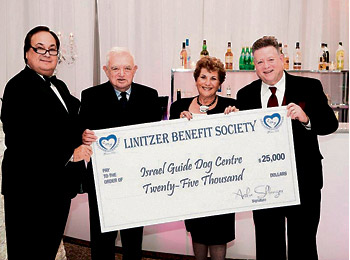TORONTO — The Linitzer Benefit Society started up in 1913 as a relief society for immigrants from the town of Linitz in Ukraine.
Now, 100 years later, the society, which has about 370 members ages 35 to 90, concentrates on helping others.
Morris Manna, honorary president, and a member for 35 years, said when Linitzer started up, all society members came from Linitz.
“These people came to Canada as strangers, and they turned to each other for support. The society helped out when a member got sick, had to make a funeral for a loved one, or lost their job. It helped relieve financial pressures,” Manna said.
“It was also a place to meet up with each other. Linitzer was the glue that brought loose people together.”
As the society grew, he said, it invested in its first group of plots at Dawes Road Cemetery, and eventually bought into Bathurst Lawn Cemetery, where it’s now the largest landowner.
“Burial rights have become a very important part of the society. Originally, only men joined, and women were entitled to burial rights. As the society became more progressive, however, women became equal members. It also started accepting those without a connection to Linitz.
“Now we look for members who can assist the society with its goals: helping support Israel, standing behind the Jewish community and fundraising.”
Over the years, he said, the society has raised money for a number of charities, including an endowment for a student to attend Hebrew University of Jerusalem, a $25,000 donation to Shaare Zedek Hospital in Jerusalem on Linitzer’s 50th anniversary, “and as far back as World War II, we assisted Canada by donating a mobile dental clinic.”
In honour of its 100th anniversary, the society held a gala dinner and donated $25,000 to the Israel Guide Dog Center for the Blind.
Andy Mayer, who joined Linitzer 57 years ago, said the organization is as active now as it’s ever been.
“We try to get in there and help out the community. For 45 years, we have been running a bingo with proceeds aimed at underprivileged children. We’re currently working on a casino night, which will help out Autism Ontario and the Canadian Diabetes Association.”
He is the society’s “hospitaler,” he said. “I phone or visit any member who becomes ill, and I report back to the other members.”
The secret to the group’s success over the years, said Jeffrey Leuchter, a “newcomer” who joined Linitzer 20 years ago, is that members are determined that it should be more than a burial society.
“We have Sunday-morning breakfasts with speakers, holiday parties, card nights and barbecues. Everything is subsidized by the society, because we want to make sure everyone can come out.”
The group runs events that attract young families, Leuchter said, because “many of them can’t afford synagogue dues, and are looking for organizations that are family friendly. This is where we come in.”
He said the social aspect of the society is crucial. “Too many societies charge annual dues and offer nothing but a cemetery plot.”
Mayer said the Linitzer has been approached by other societies that are interested in amalgamating, “but we’re growing on our own and we’re looking for young blood.”
When he joined, he said, he was 30 years old “and the original Linitzers were dying off. I was the second generation. I’m happy to see new generations join us.”
Their challenge, he said, is to train the young members to eventually take over. “They will need to handle the finances and protect our dynamic organization.”
